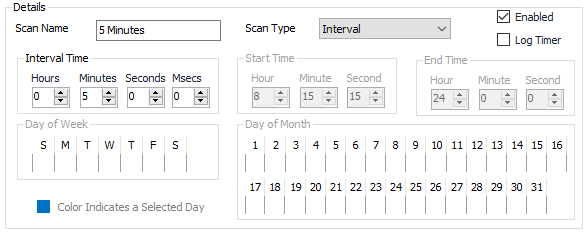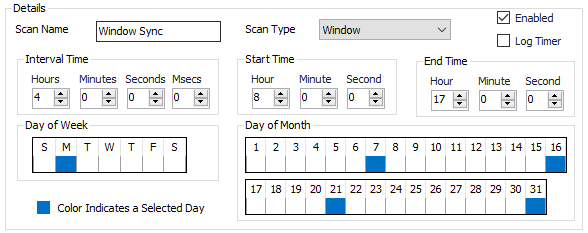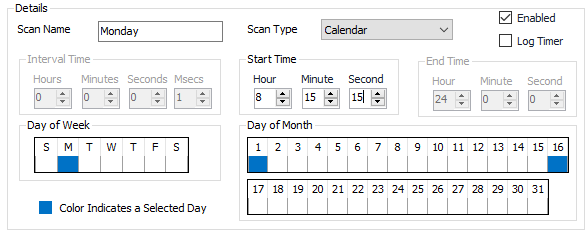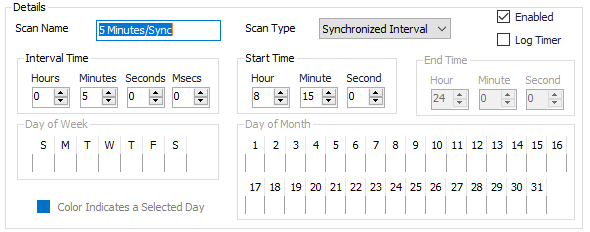Overview
Scheduling is used to notify a port object when something is due to occur. When a scheduled Interval/Scan Index combination comes due, a scheduler object will notify the port that intervals have come due. The port will queue up the device tasks based on priority and run through them until done.
While it's possible to schedule polls faster than they can occur, this does not cause queues to grow. When a task comes due for a device and an entry for the same task is already in the queue, those tasks are merged together and the queue does not grow. For example, a device might come due to poll items on interval 1. That task might stay in the queue waiting for higher priority tasks to finish when the same device comes due to poll items on interval 2. If that happens, the two tasks are merged together and a single task remains in the queue to poll items on intervals 1 and 2.
Schedule Object Configuration
This object is used to schedule when OPC items are to be polled, or other tasks such as history collection should be started. A schedule can have up to 15 intervals that come due whenever any of the 8 scan index settings elapse or meet the criteria that is configured.
General Tab
Schedule Tab
Schedule Interval
Select the Interval to configure.
Scan Index
Up to 8 scan indexes can be created for an individual interval. Scan indexes can be created using the + button and removed using the - button. Select them using the listing box.
Note
The listing grid below these two properties is a read-only display of every Interval/Scan Index combination created for this schedule object.
Details
Scan Name
Useful for describing the nature of the Interval/Scan Index combination.
Scan Type
Determines the configuration requirements for the Interval/Scan Index combination. See the Scan Type Usage and Examples section below for more details.
Details - Enabled
Default = Selected. Selecting this enables the selected Interval/Scan Index combination. If not selected, this combination will not come due.
Note
Enabled Interval/Scan Index combinations will only come due if the Schedule Object itself is also enabled (as established on the General tab).
Log Timer
Default = Not selected. Select this to log details about timer due countdown.
Interval Time
How frequently the Interval/Scan Index combination will come due.
Start Time
The time at which the Interval/Scan Index combination comes due. Used for Window, Calendar and Synchronized Interval Scan Types.
End Time
The time at which the Interval/Scan Index combination ends. Used for Window Scan Types.
Day of Week
The day(s) of the week on which the Interval/Scan Index combination comes due. Used for Window and Calendar Scan Types. Click on the square below the day to select the day. A color in the square indicates a selected day.
Day of Month
The day(s) of the month on which the Interval/Scan Index combination comes due. Used for Window and Calendar Scan Types. Click on the square below the day to select the day. A color in the square indicates a selected day.
Scan Type Usage and Examples
The selected Scan Type determines which fields are available for configuration.
The types are:
- Interval: The Interval scan type determines how frequently the Interval/Scan Index combination will come due. Once the Interval/Scan Index combination is enabled, it will come due according to the set time period. The time interval can be high as 48 hours or as low as 1 millisecond. In the following example it will come due every 5 minutes.
- Window: The Window scan type is a combination of a Calendar and Synchronized Interval scan. An Interval/Scan Index combination can be set to come due on a particular day of the week and/or specific days of the month and during specific times of the day. In the following example, the Interval/Scan Index combination will come due between 8 AM and 5 PM every Monday, as well as on the 7th, 16th, 21st, 31st of every month.
- Calendar: The Calendar scan type establishes an exact time and day of week and/or calendar day that an Interval/Scan Index combination will come due. In the following example, it will come due at 8:15:15 AM every Monday, as well as at 8:15:15 AM on the 1st and 16th of the each month.
- Synchronized Interval: The Synchronized Interval scan type is very similar to the regular interval, but it is in-sync with the provided starting time. In the following example, the Interval/Scan Index combination will come due every five minutes beginning at 8:15 AM. This will make it come due go off at 15, 20, 25, so forth. The regular Interval scan type could only accomplish this if the schedule happened to be enabled at 8:15.
Logging Tab
OnDue Tracing
Provides entries in the logger that indicate when an Interval/Scan Index combination is due. Useful for determining when a poll might come due.
Commands
See Object Commands for how to locate and execute a command.
| Command | Description | Parameters |
|---|---|---|
Set Interval 1-14 | Marks the interval as due for an immediate poll but does not change the scheduled poll time. | None |









